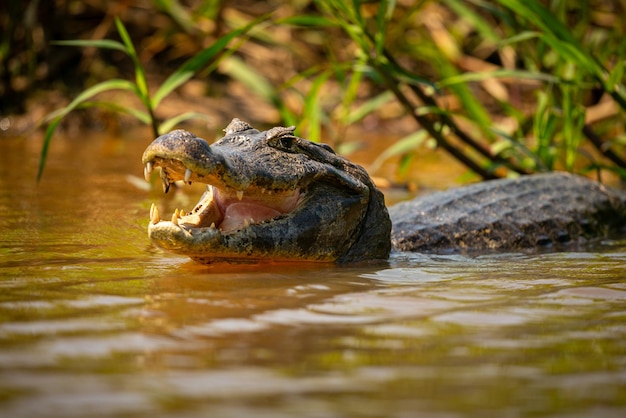

The Nile crocodile is one of the largest crocodile species in the world.
They can grow up to 20 feet long and weigh over 1,500 pounds.
Nile crocodiles are known for their powerful jaws and sharp teeth.
These crocodiles have a lifespan of up to 70 years in the wild.
They are apex predators and can consume prey as large as wildebeests and zebras.
Nile crocodiles have a reputation for being stealthy and patient hunters.
They can remain underwater for up to two hours while waiting for prey.
Despite their size, Nile crocodiles are also very agile and can move quickly both on land and in water.
These crocodiles are most commonly found in sub-Saharan Africa, particularly along the Nile River.
Nile crocodiles are cold-blooded reptiles and rely on the sun to regulate their body temperature.
They have a bony plate called a scute on their back, which provides protection.
Nile crocodiles have a strong sense of hearing and can pick up vibrations from far away.
These crocodiles have excellent night vision, allowing them to hunt effectively in the dark.
Nile crocodiles have a unique method of hunting called the gaping threat display to intimidate their prey.
They have been recorded leaping vertically out of water to catch birds in flight.
Nile crocodiles are known to be highly territorial and will fiercely defend their territory.
Female Nile crocodiles build large nests of vegetation to lay their eggs.
The temperature of the nest determines the offspring’s gender.
Nile crocodile eggs take around 90 days to hatch.
Upon hatching, the mother helps the hatchlings by carrying them to the water in her mouth.
The female Nile crocodile is extremely protective of her young and will defend them from any threat.
Nile crocodiles have a complex social structure and communicate using various vocalizations.
Although they are powerful predators, Nile crocodiles are not immune to extinction threats.
Habitat loss and illegal hunting pose significant risks to their population.
Efforts are being made to conserve and protect Nile crocodiles in their natural habitat.
Nile crocodiles play an important role in the ecosystem by helping control the population of prey species.
They have one of the strongest bites among all animal species.
Nile crocodiles are capable of rotating their eyes independently.
They have a keen sense of smell, which helps them locate prey.
Nile crocodiles have a unique groove on the roof of their mouth that allows them to keep their throat closed while capturing prey underwater.
These crocodiles have been observed cooperating with each other during hunting, displaying a level of intelligence.
Nile crocodiles have a slow metabolism, allowing them to survive for long periods without food.
They have the ability to go into a state of dormancy during the dry seasons.
The largest recorded Nile crocodile measured 23 feet long.
The scales on their body provide protection and also help with their streamlined movement in water.
Nile crocodiles are ambush predators that patiently wait for their prey to come close before attacking.
They are known to have a strong grip and can easily drag their prey into the water.
Nile crocodiles have a specialized valve system that allows them to eat underwater without swallowing water.
These crocodiles are opportunistic feeders and will consume almost anything they can overpower.
They have been found to have high levels of intelligence and problem-solving abilities.
Nile crocodile populations are monitored through various scientific research and tagging programs.
The tail of a Nile crocodile contributes to around half of its body length.
Nile crocodiles have a thick layer of fat under their skin, which helps with buoyancy in water.
Crocodile farms play a significant role in the conservation efforts of Nile crocodiles.
Despite their fearsome reputation, Nile crocodiles are fascinating creatures that deserve our understanding and protection.
Around the world, coffee enthusiasts enjoy Monin coffee concentrate since it is a multipurpose product. Conveniently combining…
The Importance of Choosing the Right Shower for Your Bathroom Renovating your bathroom can be…
Usain Bolt holds the record for the fastest 100-meter sprint in history.Bolt was named Sportsman…
Love is in the air... and it smells suspiciously like chocolate!Roses are red, violets are…
Life's a beach, take a picture and relax.Sun, sand, and salty kisses. That's what beach…
Hungary is home to the largest thermal water cave system in the world.The Rubik's Cube…